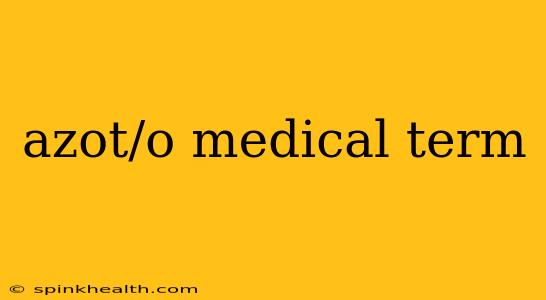Decoding the Medical Mystery: Understanding Azot/o
Have you ever encountered the medical term "azot/o" and found yourself scratching your head? This seemingly cryptic prefix actually holds a crucial key to understanding a significant aspect of human biology: nitrogen. Let's unravel the meaning and explore its applications in the medical field.
In medical terminology, "azot/o" is a combining form derived from the French word "azote," which itself originates from the Greek words "a-" (without) and "zoe" (life). Early chemists referred to nitrogen as "azote" because it doesn't support life on its own. Therefore, "azot/o" literally translates to "nitrogen" in the context of medical terminology.
While not used as frequently as some other combining forms, "azot/o" appears in specific medical contexts related to nitrogen compounds and their impact on the body. Understanding its meaning allows healthcare professionals to quickly grasp the subject of a medical term containing this prefix.
What are some medical terms using azot/o?
While "azot/o" isn't incredibly common, you'll occasionally find it in specialized fields. This is often in conjunction with other terms to describe specific conditions or tests. One example might be in discussions of nitrogen metabolism and related disorders.
What does azot/o mean in chemistry?
In chemistry, the term "azote" or its derivative is still used occasionally, particularly in older texts. It's simply another word for nitrogen (N), the chemical element.
How is azot/o used in medical diagnostics?
The usage of "azot/o" isn't directly related to specific diagnostic tests in the way some other prefixes are. Instead, understanding "azot/o" might help interpret test results related to nitrogen levels in blood or urine, providing crucial information about kidney function or metabolic processes.
What are the clinical implications of azot/o-related terms?
Clinical implications of terms incorporating "azot/o" often relate to nitrogen balance. An imbalance can reflect problems with protein metabolism, kidney function, or liver function.
Are there any other related combining forms I should know?
While "azot/o" focuses specifically on nitrogen, other combining forms relate to blood components and waste products, which often involve nitrogen compounds. Understanding these additional terms can help broaden your medical vocabulary.
The story of "azot/o" is a short but significant one in medical terminology. Although not frequently encountered, knowing its meaning unlocks a deeper understanding of medical terms related to nitrogen and its role in the human body. It's a testament to the rich history of scientific terminology and its evolution across languages and disciplines. This understanding allows for a more comprehensive grasp of medical language and fosters better communication in healthcare settings.

